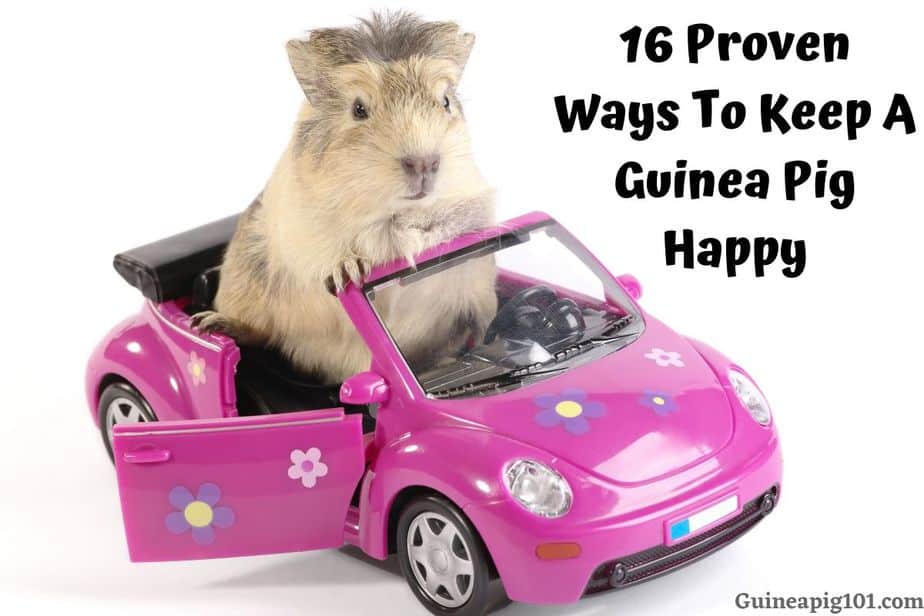Guinea pigs have become popular pets in recent years. Not knowing exactly how to care for your guinea pig can make it difficult for the owner to look after them. That makes it very important for the owner to know about how to keep a guinea pig happy and healthy.
Guinea pigs need the right nutrition as they have a very complex digestive system. Feeding them hay is very necessary as it contains all sufficient nutrients that your guinea pig needs.
Avoid feeding your guinea pig toxic foods such as rice, biscuits, nuts, etc. These poisonous foods can harm your guinea pig health. Your guinea pig needs regular exercise to prevent themselves from obesity and to remain healthy.
They will be delighted if they have a partner, and for that, you can adopt a second guinea pig.
They also need mental stimulation to keep them busy and entertained. That will help them to avoid depression and sadness.
Other things like spaying or neutering, regular grooming, and keeping your guinea pig enclosure clean is also essential.
With experience, you will learn more and more about how you can keep your guinea pig content.
You must avoid making assumptions about what is right and what is wrong for your guinea pig.
Guinea pigs and humans have a different requirement altogether, failing to acknowledge this could lead to sadness and bad health of your guinea pigs.
How do I make sure my guinea pig is happy?
There are many factors which you can be concerned about to keep your guinea pig happy and also healthy. Your guinea pig requirements will vary as they will grow older. Their love and friendship will make all this effort worthwhile.
There are some needs of your guinea pig, which you should look into it. Following these will keep your guinea pig happy and healthy while ignoring it can be a trouble for your guinea pig.
Let’s look into those needs which will keep your guinea pig happy and healthy:
1) Provide a healthy diet

Food plays the role of a keystone in your guinea pig’s life, despite the age and breed. You should make sure that you are providing your guinea pig a suitable amount of nutrition.
These are the four keystones to your guinea pig’s food:
- Hay
- Fresh vegetables
- Pellets
- Clean water
The dietary needs of your guinea pig get changed as they grow older. You should feed your guinea pig alfalfa hay till they arrive in their adulthood. Alfalfa hay contains high protein and also provides all necessary calories to your guinea pig in their growing age.
It would be best if you changed hay from your guineapig’s cage every day, as guinea pig eliminates on it. And in any case, this sends the hay moldy. Then eating mold can harm your guinea pig.
Alfalfa hay is too calorific for adult guinea pigs and also leads to a weight gain for your guinea pig. It also contains a lot of calcium in it; thus, it is not suitable for an adult guinea pig. In such a case, feed your guinea pig some other form of hay such as timothy, meadow, or oat hay.
Pellets are perfect for the baby guinea pig as they are rich in nutrients. Feed your guinea pig unlimited pellets until they come to their adulthood.
Reduce the pellets when they reach adulthood. If your adult guinea pig is not very fond of pellets, then stop completely feeding them pellets. Replace it with fresh vegetables instead.
Fresh vegetables play an important role in a guinea pig’s life. It provides them with much needed Vitamin C that hay alone cannot provide. Also, they add more nutrients to your guinea pig diet. Leafy greens seem to be best for them.
Drinking fresh and clean water is very crucial for your guinea pig. Tap water will be good for your guinea pig.
You should make sure that you refresh the water twice every day. Also, add multiple sources of water in their cage.
2) House your guinea pig in an appropriate enclosure
A cage is a home of your guinea pig. Your guinea pig should always feel happy when they are in their cage. Being in their cage will protect them with their predators as they will be unable to run free.
The very first thing to be concerned about while getting a cage for your guinea pig should be the size. This cage will be your guinea pig’s home. It should never be treated as a cage for your guinea pig.
An owner should make sure that they arrange a cage where their guinea pig can stretch from the nose to toes, at least. Your guinea pig should be able to take play and exercise around the cage as well. Also, the owner should make sure that their guinea pig should be able to stand on their rear leg comfortably.
To conclude, we can say that a pair of guinea pigs will need at least eight square feet of space and 20 inches height to be comfortable in the cage.
Being a clean animal, your guinea pig will never want to sleep or eat in the place where they eliminate. You should take care of this by arranging a sufficient zone inside your guinea pigs cage. For being happy, they will also need a space to play and perform activities in their cage.
You will not be able every time to entertain your guinea pig. Ensuring that your guinea pig is comfortable in their cage will solve this problem. If your guinea pig is healthy in their enclosure, they can wait longer to get out for playing and exercising.
3) Maintain a comfortable environment
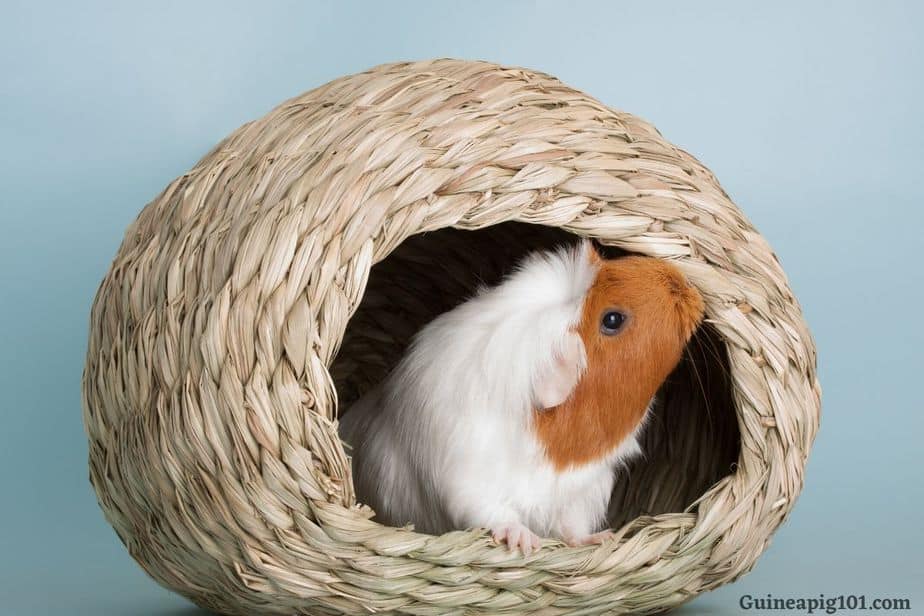
While guinea pigs are robust in the cold weather, they don’t feel comfortable in hot weather.
A guinea pig suitable body temperature is 100-103 degrees Fahrenheit. Nature plays a vital role in your guinea pig’s life as their fur sheds and grows according to the cold. You should still keep an eye on your guinea pig as the symptoms of overheating are:
- Heat around the tops of the ear
- Moistened nose
- Fast breathing
- Lack of strength
Cold weather will not be a problem for your guinea pig. A Guinea pig will grow a thick winter fur coat when they go through a worse condition living inside as well as outside all year.
You should be a concern for your guinea pig if the temperature outside falls to 20 degrees Celsius. Move your guinea pig from outdoor to indoor in such a case. A garage will be perfect for your guinea pig as long as they still can breathe adequately.
A sudden change in temperature also can harm your guinea pig. Make sure that you don’t shift your guinea pig to the hot place from the cold one. This sudden change of temperature can be dangerous for your guinea pig.
4) Neuter or Spay your guinea pigs
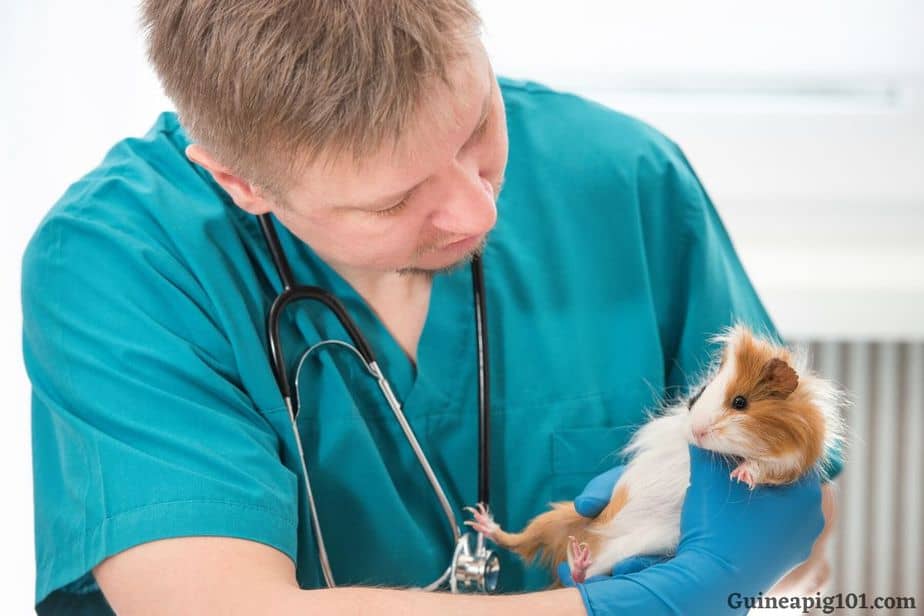
Neutering or spaying is a crucial component for your guinea pig health. You need to get your guinea pig fixed, except if you are a professional breeder who knows what they are doing. As far as you find a professional exotic vet, the method is safe and straightforward.
Guinea pigs enjoy the company of their breed. They don’t feel shy to breed. Guinea pigs are not fussy about their partners, so don’t make a mistake of thinking that adopting two siblings means they will not breed.
Guinea pigs who are spayed or neutered seem to be much calmer than their unfixed counterparts. They can get aggressive and territorial if they are not neutered or spayed. Fixing a guinea pig also reduces the probability of crucial health issues like Urinary tract infection and cancer.
5) Keep your guinea pig stress free
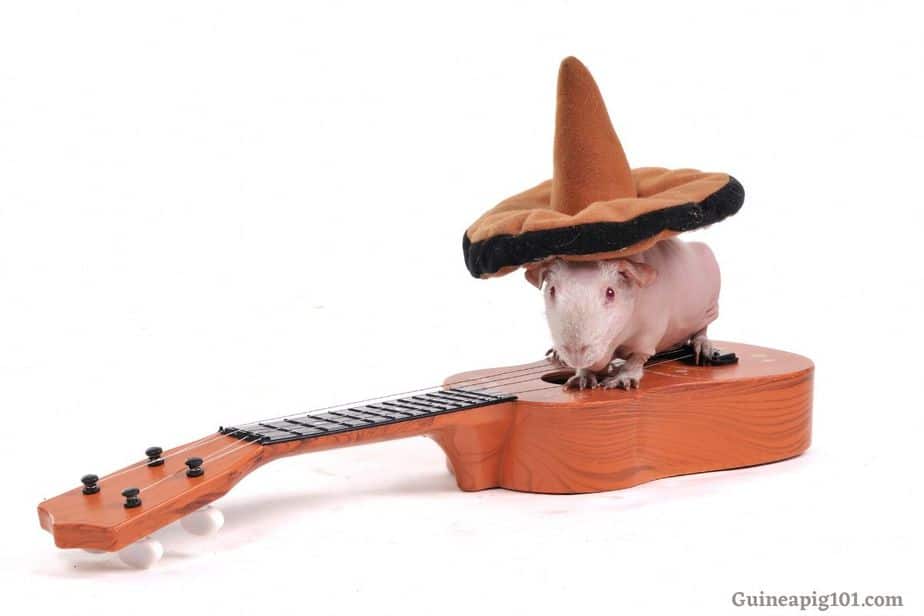
A Guinea pig can be easily stressed. Being a prey animal, they are always aware of their predator, which in result can make your guinea pig scared.
A guinea pig should feel safe and secure all the time. Even after arranging a comfortable enclosure for your guinea pig, they are not willing to return to their enclosure after floor time; then there is a safety issue.
Guinea pigs are not able to see in extreme black pitch better than human beings. They can hear and smell well, which is whenever there is a predator around their enclosure, they can detect them and be scared.
You should make sure that your guinea pig feels safe and secure whenever they are alone.
There can also be another reason for your guinea pig getting scared like a change in their schedule. Arrange a strict routine for your guinea pig. Make them trust that they will be fed, played, and exercised at a particular time.
A Guinea pig can detect a particular time when they are fed, exercised, and played after some time. If you stick to this routine, it will help your guinea pig to enjoy a happy life.
6) Ensure your guinea pigs get regular exercise

Having regular exercise keeps your guinea pig fit. Regular exercise is vital in your guinea pig’s life. It prevents them from obesity. Guinea pigs are very energetic animals, laying in their enclosure for all the day can make them dull and frustrated.
Your guinea pig should have at least three hours of free-roaming each day. You can divide it into two, one in a morning when they are feeling most active, and another one again in the early morning.
Arranging a small portable enclosure will be the best way to get your guinea pig exercise in the morning.
You have to watch your guinea pig while doing these activities as they can be master in jumping and escaping. Also, there is a possibility that your guinea pig runs themselves in extreme physical and mental tiredness.
You can also attach a run to your guinea pig enclosure, which will let them exercise in their free time.
7) Provide enough toys and mental stimulation
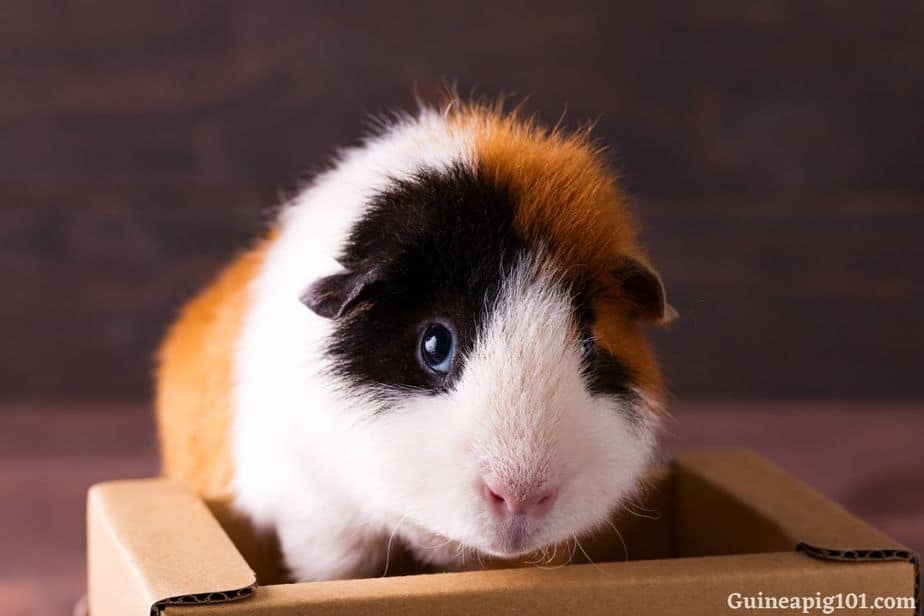
Guinea pigs are smart creatures and they do get bored easily. Arrange some toys to keep your guinea pig entertained while they are in their enclosure.
Arrange as many toys and activities as you can in your guinea pig enclosure.
Pieces of Stuff at your home can be the mode of entertainment for your guinea pig.
A telephone directory will play the role, as your guinea pig will like shredding the pages. You can arrange such things which your guinea pig shouldn’t chew, though
Provide your guinea pig different types of toys and activities regularly. That will make them happy.
Toys are essential to keep our guinea pigs mentally and physically stimulated and happy.
8) Make sure your guinea pigs have a companion
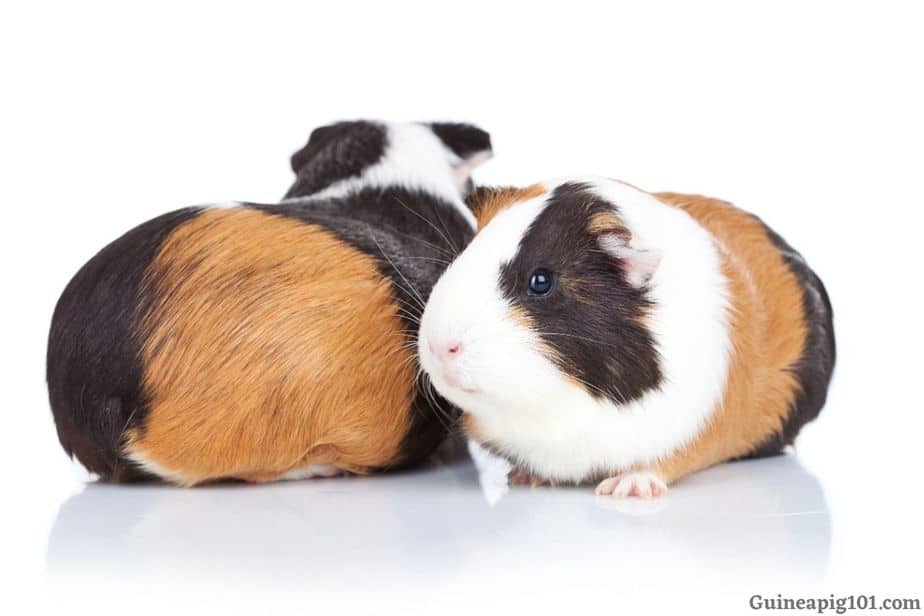
Guinea pigs are not very fond of living alone. They usually live in a group in the wild. Living alone can be the reason for stress. Guinea pigs always want attention, and if you are not able to give it every time, you should adopt a second guinea pig.
Your guinea pig will happily allow their fellow partner to live in their enclosure. First, you just have to ensure that they are bonded. Once they are bonded, then they will live happily with each other.
9) Clean your guinea pig’s cage regularly
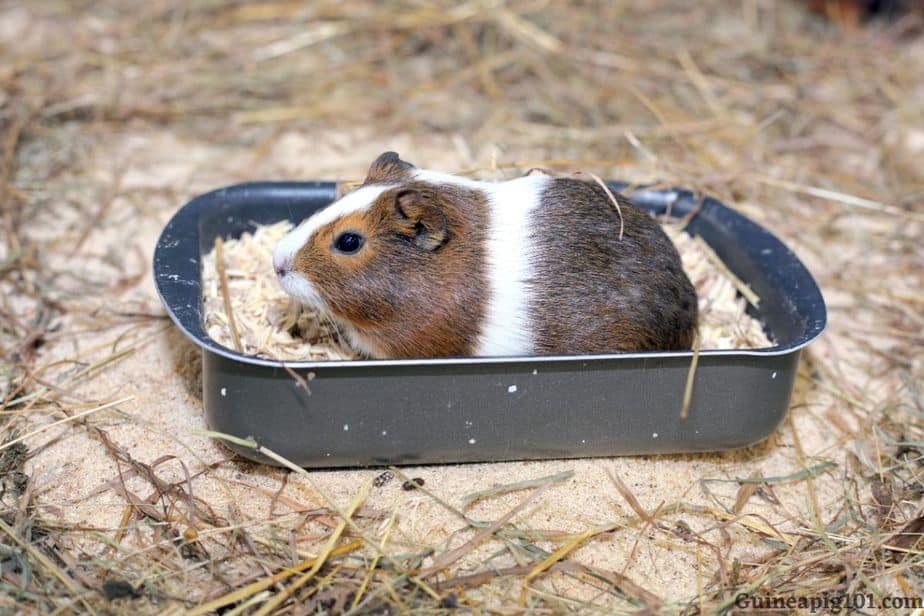
Cleaning your guinea pig cage is crucial to prevent various health issues in guinea pigs. They will not seem to be happy while you clean their cage as they will think that you are interfering with their territory. But this is the only way to keep your guinea pig healthy.
Clean your guinea pig cage properly once in every week. You should use pet-safe cleaning materials for cleaning your guinea pig cage. Return things as you found them while cleaning your guinea pig cage.
Make sure to change your guinea pig hay and litter every day from their cage. Mold can be the issue for your guinea pig.
10) Groom your guinea pigs regularly
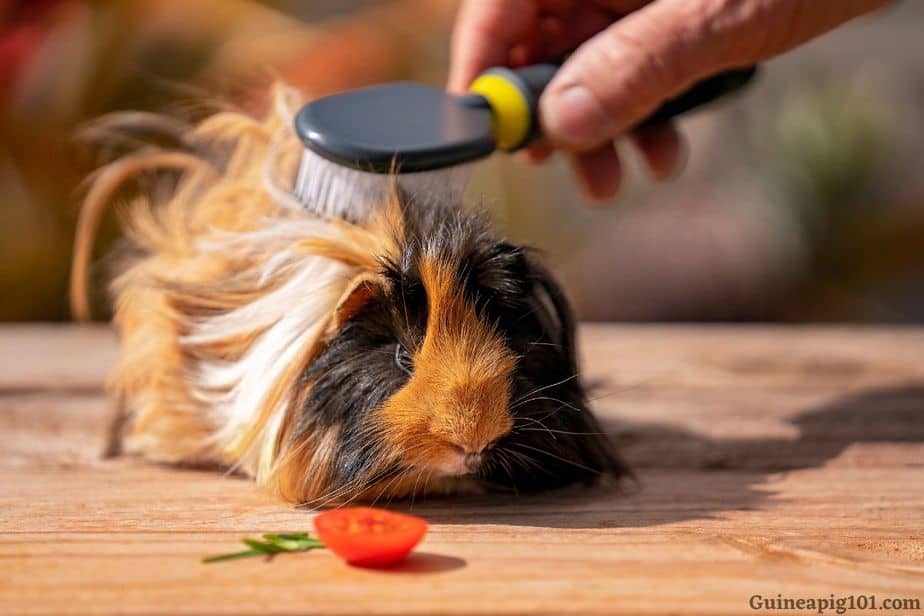
Grooming is an essential part of a guinea pig’s life. Usually, guinea pigs use grooming to determine their place within a social hierarchy. A compliant guinea pig will groom the ruling guinea pig on demand.
Your guinea pig may also want to be groomed by you. You should groom your guinea pig as there is no issue to let your guinea pig think that they are the boss of the house.
Creating better bond grooming is the best way. Guinea pigs find grooming very enjoyable. Also, it will help you to win your guinea pig trust.
Guinea pig meticulously clean by their nature. If you find your guinea pig fur matted, then there can be an issue, as a guinea pig will always clean themselves. If they are not doing it, then they may be suffering from a health problem. Take it seriously.
Look after your guinea pig bottom while grooming. A dirty bottom can lead to a very dreadful condition known as flystrike.
Also, if there is a urine stain on your guinea pig fur, then take it seriously. It can lead to urine scalding if it remains too long, which is a very painful condition.
That can happen when your guinea pig accidentally pees on themselves or sits where they have peed.
11) Check your guinea pig’s dental health
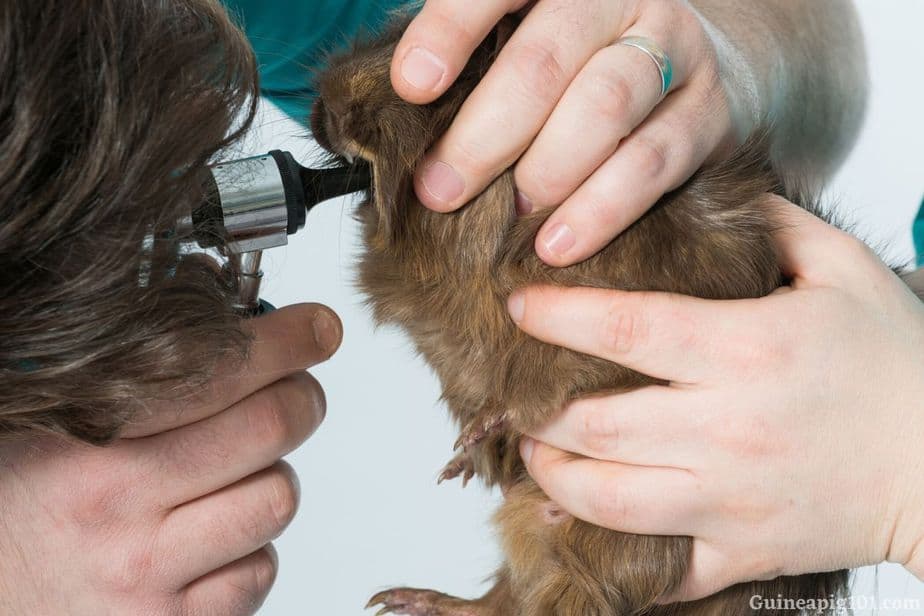
You should always make sure that your guinea pig teeth are healthy. Guinea pig teeth grow continuously. Large teeth can lead to discomfort.
Your guinea pig will stop eating if they feel pain in their teeth. Not eating can lead to a hazardous condition of your guinea pig.
You should feed your guinea pig an unlimited supply of hay. Hay keeps your guinea pig teeth fine as munching on hay will keep their teeth filed. A high fiber diet is crucial to oral health in a guinea pig.
You should check your guinea pig teeth at least once a week. Make your guinea pig tooth is white, smooth, and both rows top and bottom meet neatly. If you find any issue take your guinea pig to the vet as they will need treatment.
12) Provide them with annual health check ups

Being a prey animal guinea pigs are very much good at hiding their pain and discomfort. Also, you can come to know about your guinea pig issue when it becomes very critical.
An annual checkup can solve this issue. Find a professional guinea pig vet or an exotic vet in your area as every vet is not familiar with the unique illness of guinea pig.
Any problem can be detected early if you get your guinea pig a health checkup at least once in a year. You can identify if your guinea pig is going through obesity or any dental issue by regular checkups.
Getting your guinea pig once a year for a health checkup can help detect any issue and be treated. That will help your guinea pig to remain healthy.
13) Guinea pig proof your house
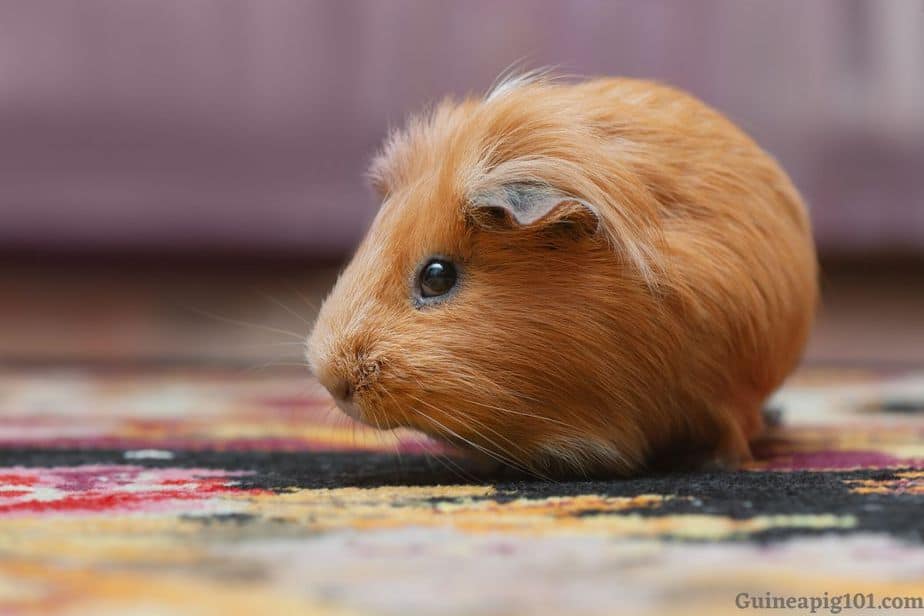
Your guinea pig will run free for some hours every day as they will be a part of your family. You should make sure that your guinea pig is safe and secure while running free.
Some of the common concerns include:
- Escape routes: Guinea pig is an animal who is eager to know or learn something. They may squash through the holes in a garden fence if you are letting them out to play. You should block every escape route as the domesticated guinea pig will not be able to survive in the wild.
- Electrical cables: Electrical cables are too attractive for a guinea pig. They will chew on them. It can be dangerous for both parties. Chewing wire can harm your guinea pig teeth also can there be a possibility of catching fire.
- Other pets: Keep your guinea pig away from the other pet if you have one. Make sure to keep them separated until they come to understand each other.
- Soft landings: You can arrange carpets or rags on your guinea pig landing spot. Guinea pigs can harm themselves by jumping off from the height to concrete material.
Guinea pig proofing home is significant as your guinea pig can harm themselves in several ways.
14) Handle your guinea pig with care
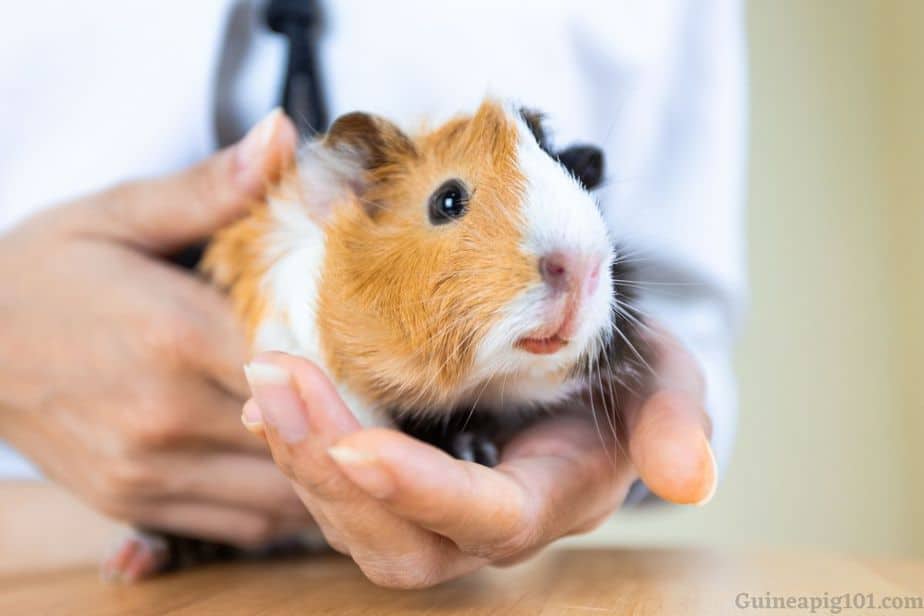
Handling a guinea pig is a very condemnatory skill that should be done correctly. Sometimes your guinea pig will not like to be picked up as they will feel trapped and frightened. In such a case, they can also jump off to escape.
Sometimes handling your guinea pig is essential. You’ll need to bring them out of their enclosure for cleaning if they are unwilling to leave.
Also, for getting your guinea pig to the vet, you have to pick them up.
Ensure you never pick up your guinea pig by their legs, ears, or the scruff of their neck.
To handle a guinea pig:
- Make your guinea pig calm by petting them.
- Don’t scoop your guinea pig from a standing position of yours as it will terrify them. They will be scared of their predator. Get down to your guinea pig level.
- After that, place one hand under the guinea pig chest and the other under their back end. That will distribute the weight of your guinea pig.
- Pick the guinea pig into your chest to get them close enough so that they can’t escape. Don’t hold tightly as it can hurt your guinea pig.
- If your guinea pig doesn’t feel comfortable, then put them down.
Handling and over that not being very fond of getting picked is something that must be considered. Because of this fear of handling, guinea pigs are not suitable pets for children.
Guinea pigs can harm themselves by jumping off the shoulder. They can bite, nip, or kick to be free from your shoulder. Also, make sure you don’t handle baby guinea pigs until they are at least 2-3 weeks old.
15) Listen and understand your guinea pigs behavior and sounds

Whenever other pets get suffocated or get angry, they express their feelings or emotions by barking or meowing. Guinea pigs are categorized as quiet animals. But they do communicate physically and verbally with human beings.
Some of the verbal tics are there to listen to your guinea pigs are as follows:
- Grunting: This shows that your guinea pig is unhappy. As whenever you try to clean their cage or try to handle them, at that moment, you will hear these sounds.
- Tooth clicking: You will come to listen to this sound during grooming or petting, which is similar to a feline purr. From this, you will get to know that your guinea pig is happy and content.
- Tooth grinding: Grinding tooth is very much essential to understand as this is different from tooth clicking. Whenever your guinea pig tries to grind their teeth, they are in pain and need medical treatment.
- Purr: Your guinea pig may purr in case they are happy or if they get scared of something. They also chatter when they are not satisfied.
Also, you can understand your guinea pig’s body language:
- Popcorning: Popcorning is a behavior that guinea pigs do when they are excited. They usually do this when they get their favorite food.
- Freezing: A guinea pig that is feeling or showing sudden shock or alarm and unknown about something in its environment will stand unmoving.
- Sniffing: They do sniffing to check what is going around them; also, they do so to know each other. Guinea pigs particularly like to smell each other around the chin, nose, back end, and ears.
- Touching Noses: This is a sign of a friendly greeting between guinea pigs.
- Laying on the side: Your guinea pig is relaxing whenever they are laying on their side. You will come to see this when they become tired of exercise or by playing for long. At that time, guinea pigs get exhausted and prepare themselves to take a nap. As guinea pigs don’t play much.
- Nibbling While Being Held: This can signify that your guinea pig wants to use the bathroom or is not comfortable with being held. Release your guinea pig in their cage in such a case.
- Licking: Most owners believe this as a sign of guinea pig fondness, though it is possible that they just like the taste of the salt on your skin.
16) Prepare for a long term commitment
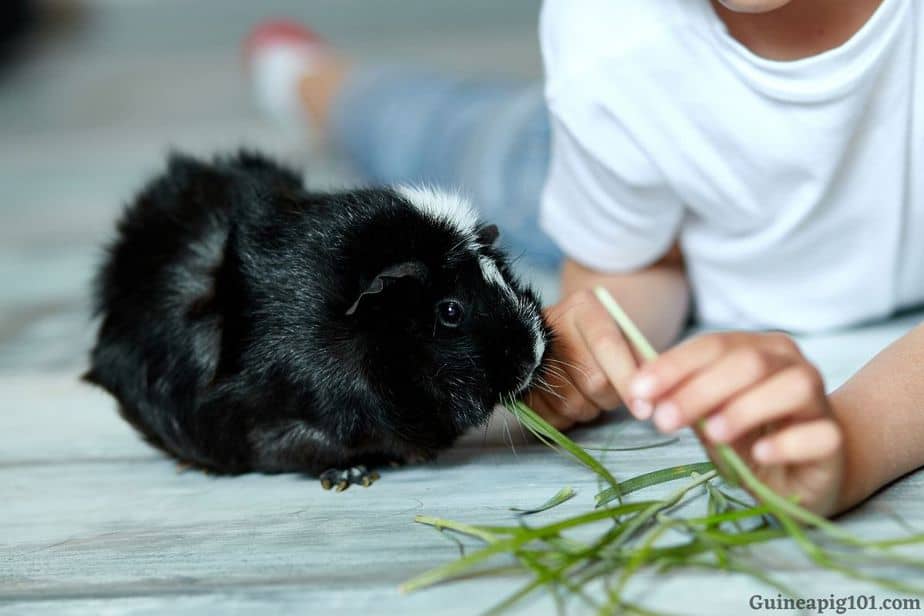
Happy and healthy guinea pig is a long term commitment. A guinea pig can live to have a lifespan of a 4-6 years if you help them to live so.
A well-cared domestic guinea pig can live longer than a normal guinea pig. There are guinea pigs who have lived for over a decade with no problem whatsoever.
You should prepare your mind for caring and manage the expenses of your guinea pig for 8-10 years.
It takes money and time to keep your guinea pig healthy. Your guinea pig will also have different needs as they reach different stages of their life cycle.
Your guinea pig will live a happy and healthy life if you are ready to do all this.
Sources: Brain and body growth of guinea-pigs, Care of Guinea Pigs, Petsaver guinea pig guide, Guinea pig care.
